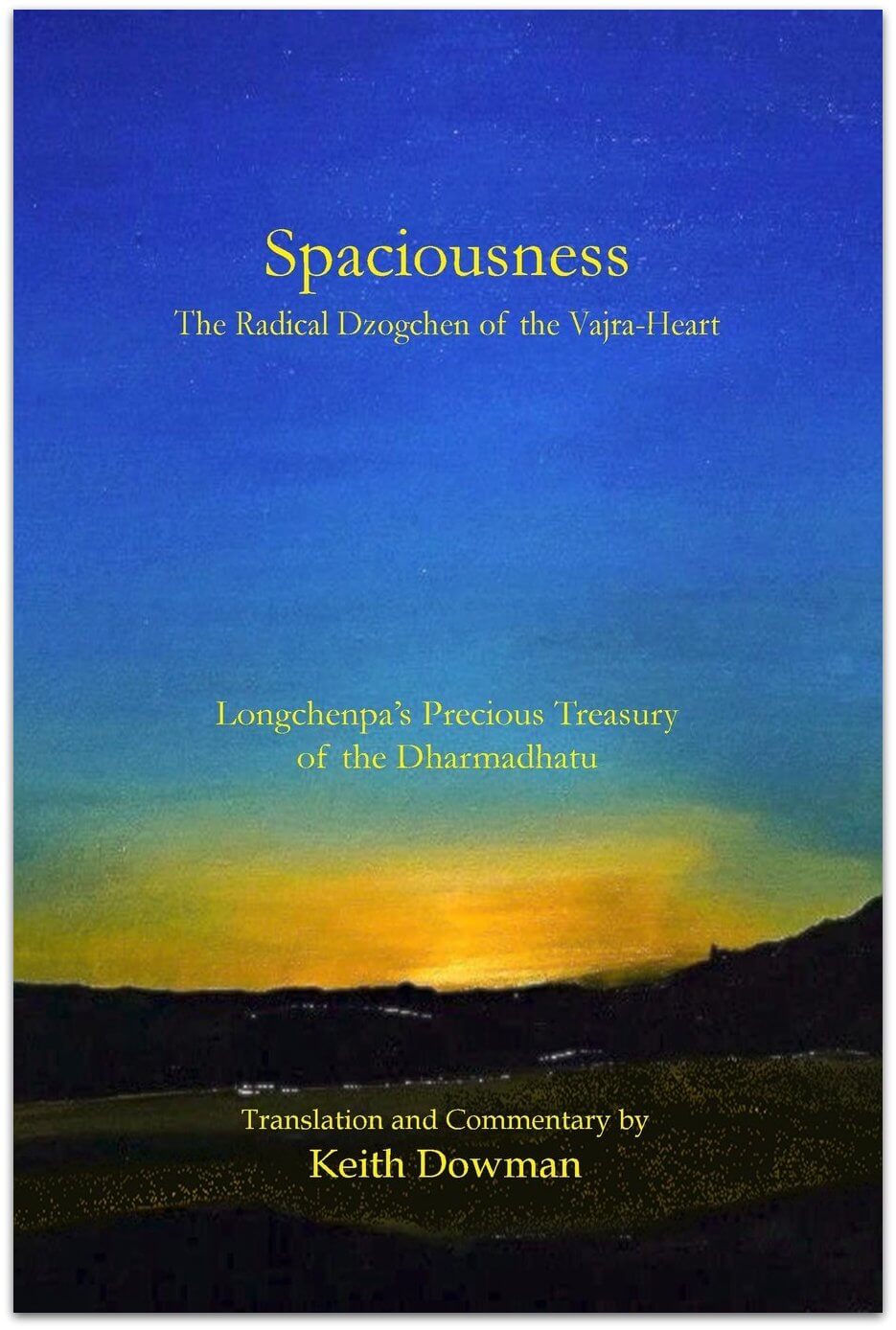From the Introduction
This all-inclusive view that is the reality of radical Dzogchen is not dependent upon any religious culture, although the priests of the Buddhist and Bon religions of Tibet have been the custodians and occasional exemplars of it.
For that we owe them an enormous debt of gratitude, which is now being repaid by patrons and disciples in the dharma-centers throughout the world, and an even greater debt for investing us in the West in their vital tradition, repaid by our recognition of the nature of mind.
But radical Dzogchen is, after all, as the tradition affirms, what we have always known. We know the inimical truth of being along with all human beings who listen to their deep heart’s core and at the same time open their eyes to what is there in front of their faces.
We know it in the same way that we know the pulsing of the blood in our veins and the touch of the inbreath and the outbreath on our nostrils.
The truth of Dzogchen is the legacy of being human.
But Judeo-Christian theism and Manichean dualism have persistently obstructed such direct knowledge, nondualism proscribed as heretical, and Christian culture has never been able to articulate it sufficiently to create an integral lineal tradition, either covert or secular.
Nevertheless, the nondual reality of Dzogchen shines through European literature and poetry by other means.
It is evident in popular culture – or is it most particularly evident in pop culture? – and the truth dawns that it is the heartbeat of all culture.
By virtue of the counter-cultural revolution of the sixties, moreover, insofar as the communal mind was opened and made receptive to the profound blast of radical Dzogchen, today we have access to texts such as those of Longchenpa, each containing an identical vision, like pixels in a hologram, that simultaneously mirror and irradiate disparate visions in the minds of innumerable people around the world.
The yoga of the vajra-heart, Maha-Ati, the apex path, is not part of the ninefold schema of progressive Nyingma Buddhism and yet it infuses all nine aspects.
Longchenpa introduces it as an ultimately transcendent view that lies outside the narrative of the nine paths and outside the conventional frame that includes atiyoga. In so doing he provides a rationale for the perception of Dzogchen independent of its Buddhist context, a separable and discrete discipline.
Such a perspective is key to the radical Dzogchen view; the recognition of the nature of mind is predicated upon the introduction from a master, whether he is a Buddhist or Bon rigzin-lama, and regardless of his religious faith or whether indeed he is of a religious or secular disposition. On the other hand, in some cantos within this poem, Longchenpa appears to identify the apex view with atiyoga, the ninth path.
The distinction here is to be made between instantaneous Dzogchen perceived as simultaneous starting point and destination, wherein no gradation within a space- time frame can be admitted, and Dzogchen as a short – momentary – path, a doorway into the nature of mind in space-time.
From Canto Ten: Vision
Matter and spirit are the same in intrinsic spaciousness,
And buddha and sentient beings are the same in intrinsic spaciousness,
And absolute and relative are the same in intrinsic spaciousness,
And sin and virtue are the same in intrinsic spaciousness,
And the ten directions are all the same in intrinsic spaciousness.
Consequently, everything arising as self-sprung display,
At its inception, all the same, nothing ever better or worse,
What is the use of positive or negative antidotes?
In their abiding, all things are the same, nothing ever better or worse, So let whatever arises in the mind subside into itself right now!
In their release, all things are the same, nothing ever better or worse, So in the aftermath, why make any judgment?
***
No matter how we feel, we abide in the nature of mind;
No matter how we live, we stay in the nature of mind;
No matter how we move, we move in the nature of mind.
In luminous spaciousness, coming and going are impossible –
No movement in the victors’ dimension!
Whatever we say reverberates as mind's nature;
Whatever is expressed is articulated as mind's nature:
In luminous mind no verbal expression manifests,
For the speech of the victors is ineffable.
Whatever ideas emerge are thought as the nature of mind;
Whatever concepts emerge are conceived as the nature of mind:
In luminous mind ideas and concepts never truly exist
For the mind of the victors is a thoughtless mind.
From Canto Twelve: Release
In short, all conscious sensory perception,
And all that is unconscious or transcendent,
Everything is already released in the spaciousness of the now,
So any attempt to liberate anything anew is superfluous.
It is pointless to try to make effort towards release!
So don’t try! Don’t try! Don’t struggle and strive in practice!
Don’t seek! Don’t seek! Don’t seek intellectual truth!
Don’t meditate! Don’t meditate! Don’t contrive meditation!
Don’t analyze! Don’t analyze! Don’t analyze in or after an event!
Don’t practice! Don’t practice! Don’t practice the upshot of hope and fear!
Don’t reject! Don’t reject! Don’t reject emotional karma!
Don’t believe! Don’t believe! Don’t believe in righteous religion!
Don’t trap yourself! Don’t trap yourself! Don’t cage your mind!

